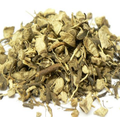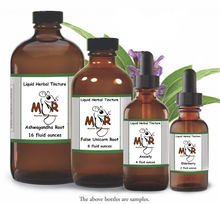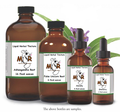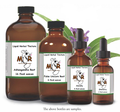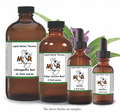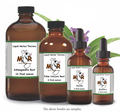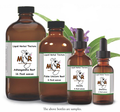 Loading... Please wait...
Loading... Please wait...- Home
- Herbal Tinctures
- Herbal Tinctures - Single Herbs
- Turmeric Root Tincture
Turmeric Root Tincture
Product Description
Turmeric Root Tincture
Made with Fresh Turmeric Root and Certified Organic Alcohol. 1:2 Ratio
Overview - Turmeric has a peppery, warm and bitter flavor and a mild fragrance slightly reminiscent of orange and ginger, and while it is best known as one of the ingredients used to make curry, it also gives ballpark mustard its bright yellow color.
Turmeric comes from the root of the Curcuma longa plant and has a tough brown skin and a deep orange flesh. Turmeric has long been used as a powerful anti-inflammatory in both the Chinese and Indian systems of medicine. Turmeric was traditionally called "Indian saffron" because of its deep yellow-orange color and has been used throughout history as a condiment, healing remedy and textile dye.
Medicinal Uses - Turmeric is used for arthritis, heartburn (dyspepsia), stomach pain, diarrhea, intestinal gas, stomach bloating, loss of appetite, jaundice, liver problems and gallbladder disorders.
It is also used for headaches, bronchitis, colds, lung infections, fibromyalgia, leprosy, fever, menstrual problems, and cancer. Other uses include depression, Alzheimer’s disease, water retention, worms, and kidney problems.
Some people apply turmeric to the skin for pain, ringworm, bruising, leech bites, eye infections, inflammatory skin conditions, soreness inside of the mouth, and infected wounds.
TURMERIC USES & EFFECTIVENESS
- Osteoarthritis. Some research shows that taking turmeric extracts, alone or in combination with other herbal ingredients, can reduce the pain caused by osteoarthritis. In one study, turmeric worked about as well as ibuprofen for reducing osteoarthritis pain.
- Alzheimer’s disease. Early research shows that taking curcumin, a chemical found in turmeric, daily for 6 months does not benefit people with Alzheimer’s disease.
- Eye inflammation (anterior uveitis). Early research suggests that taking curcumin, a chemical found in turmeric, might improve symptoms of long-term inflammation in the middle layer of the eye.
- Colorectal cancer. Early research suggests that taking turmeric might stabilize some measures for colon cancer. There is also early evidence that taking curcumin, a chemical found in turmeric, daily for 30 days can reduce the number of precancerous glands in the colon of people at high risk of cancer.
- Bypass surgery (coronary artery bypass graft surgery). Early research suggests that taking curcumin, a chemical found in turmeric, 3 days before surgery and continuing for 5 days after surgery can lower the risk of a heart attack following bypass surgery.
- A type of inflammatory bowel disease called Crohn’s disease. Some evidence suggests that taking curcumin, a chemical found in turmeric, daily for one month can reduce bowel movements, diarrhea, and stomach pain in people with Crohn’s disease.
- Diabetes. Early research suggests that taking turmeric daily for 9 months can reduce the number of people with prediabetes who develop diabetes.
- Stomach upset (dyspepsia). Some research shows that taking turmeric by mouth might help improve an upset stomach.
- Gum disease (gingivitis). Early research suggests that using a turmeric mouthwash is as effective as a drug-therapy mouthwash for reducing gum disease and bacteria levels in the mouth, but not for reducing plaque.
- Stomach ulcers caused by Helicobacter pylori (H pylori) infection. Early research suggests that taking turmeric daily for 4 weeks is less effective than conventional treatment for eliminating certain bacteria (H. pylori) that can cause stomach ulcers.
- Irritable bowel syndrome (IBS). Early research suggests that taking a turmeric extract daily for 8 weeks reduces the occurrence of IBS in people with IBS who are otherwise healthy.
- Skin rash (Lichen planus). Taking a certain product containing chemicals found in turmeric daily for 12 days can reduce skin irritation caused by lichen planus.
- Kidney inflammation (Lupus nephritis). Early research suggests that taking turmeric daily for 3 months can reduce blood pressure and improve kidney function in people with kidney inflammation.
- Stomach ulcers (peptic ulcer disease). Early research suggests that taking turmeric daily for 4 weeks does help heal stomach ulcers.
- Itchy skin (pruritus). Early research suggests that taking a specific product (C3 Complex) that contains curcumin, a chemical found in turmeric, and an extract of black or long pepper (Bioperine) can reduce skin itching and improve quality of life in people with chronic itching.
- Rheumatoid arthritis (RA). Early research suggests that curcumin, a chemical in turmeric, might help reduce some symptoms of rheumatoid arthritis.
- Skin wounds due to cancer. Early research suggests that applying a turmeric ointment might help to relieve odor and itching caused by wounds associated with different types of cancer.
- Recover from surgery. Early research suggests that taking curcumin, a chemical found in turmeric, daily for up to one week after surgery can reduce pain, fatigue, and the need for pain medications.
- Tuberculosis. Early research suggests that taking a product containing turmeric and Tinospora cordifolia can reduce bacteria levels, improve wound healing, and reduce liver toxicity in people with tuberculosis who are also receiving antituberculosis therapy.
- A type of inflammatory bowel disease called ulcerative colitis. Early research suggests that taking curcumin, a chemical found in turmeric, daily for up to 6 months can reduce symptoms and the recurrence of ulcerative colitis when used in combination with conventional treatments.
- Jaundice.
- Hepatitis.
- Diarrhea.
- Fibromyalgia.
- Liver and gallbladder problems.
- Headache.
- Menstrual problems.
- Pain.
- Ringworm.
- Bruising.
Suggested Preparations - Use 6-12 drops in juice or water, under the tongue or as desired. May be taken 3 times daily. Shake well. Store in cool dark place. Keep out of reach of children.
Special Precautions & Warnings:
Pregnancy and breast-feeding: During pregnancy and while breast-feeding, turmeric is LIKELY SAFE when taken by mouth in amounts commonly found in food. However, turmeric is LIKELY UNSAFE when taken by mouth in medicinal amounts during pregnancy. It might promote a menstrual period or stimulate the uterus, putting the pregnancy at risk. Do not take medicinal amounts of turmeric if you are pregnant. There is not enough information to rate the safety of medicinal amounts of turmeric during breast-feeding. It is best not to use it.
Gallbladder problems: Turmeric can make gallbladder problems worse. Do not use turmeric if you have gallstones or a bile duct obstruction.
Bleeding problems: Taking turmeric might slow blood clotting. This might increase the risk of bruising and bleeding in people with bleeding disorders.
Diabetes: Curcumin, a chemical in turmeric, might decrease blood sugar in people with diabetes. Use with caution in people with diabetes as it might make blood sugar too low.
A stomach disorder called gastroesophageal reflux disease (GERD): Turmeric can cause stomach upset in some people. It might make stomach problems such as GERD worse. Do not take turmeric if it worsens symptoms of GERD.
Hormone-sensitive condition such as breast cancer, uterine cancer, ovarian cancer, endometriosis, or uterine fibroids: Turmeric contains a chemical called curcumin, which might act like the hormone estrogen. In theory, turmeric might make hormone-sensitive conditions worse. However, some research shows that turmeric reduces the effects of estrogen in some hormone-sensitive cancer cells. Therefore, turmeric might have beneficial effects on hormone-sensitive conditions. Until more is known, use cautiously if you have a condition that might be made worse by exposure to hormones.
Infertility: Turmeric might lower testosterone levels and decrease sperm movement when taken by mouth by men. This might reduce fertility. Turmeric should be used cautiously by people trying to have a baby.
Iron deficiency: Taking high amounts of turmeric might prevent the absorption of iron. Turmeric should be used with caution in people with iron deficiency.
Surgery: Turmeric might slow blood clotting. It might cause extra bleeding during and after surgery. Stop using turmeric at least 2 weeks before a scheduled surgery.
Disclaimer - The information presented herein by Mountain Maus’ Remedies is intended for educational purposes only. These statements have not been evaluated by the FDA and are not intended to diagnose, cure, treat or prevent disease. Individual results may vary, and before using any supplements, it is always advisable to consult with your own health care provider.


